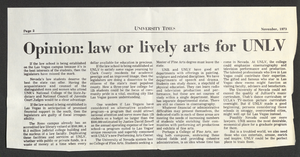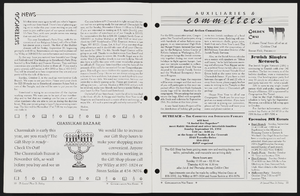Search the Special Collections and Archives Portal
Search Results

Transcript of interview with Mazie Martin Jones by Jane P. Kowalewski, November 3, 1978
Date
Archival Collection
Description
On November 3, 1978, Jane P. Kowalewski interviewed Mazie Martin Jones (born in Las Vegas, Nevada) about her father, Doctor Roy Martin, the first doctor to own a private practice in Las Vegas. Jones explains how her father first arrived in Nevada and his different investments in real estate, hospitals, and hotels. She goes on to explain her father’s hotel pursuits after retiring from medicine in the late forties.
Text

Transcript of interview with Ann Lynch by Emily Powers, May 27, 2008
Date
Archival Collection
Description
Ann Lynch discusses her background - born in Kansas City, 1934; attended Baker University in Baldwin, Kansas; classes at Kansas University; a year in theater; director of PR at Evansville University. In 1959 she came to Las Vegas as director of the clubs at Nellis Air Force Base. Ann shares in depth on her parents and grandparents and on her family today, which includes a brother 14 years younger, her son, and a nephew. She describes Las Vegas in the early sixties, meeting her husband, and her duties as club manager at Nellis. She comments on becoming camp director for the Girl Scout program at Mount Charleston, which led to training scout leaders and board members. When Ann's son Edward went to kindergarten, she took on the PTA job of parliamentarian, then president of Ruth Fyfe ES PTA. She eventually became President of the Las Vegas Area Council, Nevada State PTA president, and finally national president of the PTA. The school named after her (Ann T. Lynch Elementary) has benefited from her other charity organizations. Because of her PTA involvement, Ann became very active in legislation in Washington, D.C., traveling to other countries to help activate parent involvement. She had also worked with Sunrise Hospital during this time and when she was relieved of some of her PTA duties, she helped found the Sunrise Hospital Children's Foundation and the Public Education Foundation. She details the many functions of both foundations. Ann comments on the lobbying she does in the Nevada legislature and in Washington, D.C., medical billing through Medicare and Medicaid, and the ongoing shortage of nurses nationwide. She offers opinions on unions for nurses and mentions robotic surgery, the stroke center, neonatal center, and breast cancer center as evidence of recent developments in medicine at Sunrise Hospital.
Text

Transcript of interview with Billy Paul Smith by Claytee White, October 3, 2013
Date
Archival Collection
Description
Chemist, mathematician, and health physicist Billy Paul Smith donates time to tutor young people in hopes of attracting more youth into the fields of math and science. Born in 1942 and schooled in segregated black schools in Shreveport, Louisiana, and Texarkana, Texas, he graduated from high school at age fifteen and enrolled at Prairie View A&M University, where he trained with the Reserve Officer Training Corps (ROTC) and earned his Bachelor’s degree in chemistry and in 1964 his Master’s degrees in chemistry and math. Most young U.S. Army officers in 1964 went to Vietnam, but Billy’s math and science background steered him to the Army Chemical Corps, where he was quickly selected to join a new team. The team was to develop responses to nuclear weapon accidents and worked under the Defense Atomic Support Agency (DASA) in Albuquerque, New Mexico. At the same time, Billy completed the Weapons Ordinance Army course on classified information relating to the U.S. nuclear weapons arsenal. In this interview, Billy talks about his service with DASA and his subsequent twenty-seven years working at the Nevada Test Site in a variety of positions with Reynolds Electrical and Engineering Company, Inc. (REECo), a company that had “percentagewise more blacks in management positions than any other [Las Vegas] company.” He experienced the quiet racism of Las Vegas residential segregation when he tried to purchase a house in a neighborhood he liked and the unexpected kindness of the REECo general manager, Ron Keen, who made sure the Smith family could live where they wanted to live. He talks about Area 51 and explains underground testing activity and offers the scientific and ecological reasons why scientists deemed Yucca Mountain safe to store nuclear waste. After retiring at fifty-two, Billy and a colleague formed an independent instrumentation company, which, from 1995–2005 provided and calibrated radiological measurement and detection instruments for the decommissioning and closure of the Rocky Flats nuclear plant in Golden, Colorado. During that time, Billy rented an apartment in Boulder, but he and Jackie maintained their Las Vegas home, where they still reside. Billy shares memories of places he and his wife used to enjoy on the Westside and tells of their longtime friends in the black community. He also talks about developing his philosophy of philanthropy through Alpha Phi Alpha Fraternity and discusses becoming a member of the Knowledge Fund Advisory Council for the Governor’s Office of Economic Development (GOED) and the advisory council for the Nevada System of Higher Education.
Text

Mabel Hoggard: lesson plans and textbooks
Date
Archival Collection
Description
Folder of materials from the Mabel Hoggard Papers (MS-00565) -- Educational work and legacy file. The folder contains a "Teachers' manual for human geography," teaching notes, notes on United States history, assignments, and an exam book with handwritten notes. Many of the documents are handwritten.
Mixed Content

University of Nevada, Las Vegas law school establishment: correspondence, newspaper clippings, and reports
Date
Archival Collection
Description
Folder from the Jean Ford Papers (MS-00025) -- Political materials file.
Text

Sergio "Checko" Salgado oral history interview: transcript
Date
Archival Collection
Description
Oral history interview with Sergio "Checko" Salgado conducted by Laurents Bañuelos-Benitez, Barbara Tabach, Elsa Lopez, and Monserrath Hernández on June 4, 2019 for the Latinx Voices of Southern Nevada Oral History Project. Checko talks about his personal history that led him to pursue journalism and photography. He discusses his education and employment working in art galleries in Denver, Colorado and Las Vegas, Nevada and the various art exhibitions he has designed including in the Marjorie Barrick Museum at the University of Nevada, Las Vegas and in the Reynolds Senate Building in Washington, D.C.
Text

Alan Stock oral history interview: transcript
Date
Archival Collection
Description
Oral history interview with Alan Stock conducted by Barbara Tabach on December 27, 2017 for the Remembering 1 October Oral History Project. In this interview, Alan Stock discusses moving to Las Vegas, Nevada in 1999 for his job as a radio talk show host for KXNT. Stock describes the broadcast that covered the October 1, 2017 Las Vegas mass shooting from 11 PM on that night until 9 AM the next morning. He talks about some of the calls the station received from various members of the community, including survivors of the shooting, families of those at the event, people on lockdown in the nearby hotels, doctors, and general listeners. Stock describes some of the topics discussed on the broadcast, such as what was currently happening on the Las Vegas Strip, stories of the aftermath, and the support needed from the general public. Other topics include gun control and conspiracy theories. He discusses the impact this and other shootings would have on public affairs, including tighter security in daily living and public gatherings. He compares security in the United States to security in Israel and other countries, focusing on the idea of unconcealed guns worn in public. Throughout this interview, Alan Stock explains that the radio station's goal was to provide accurate information to the public during the aftermath of the October 1, 2017 mass shooting.
Text

Elaine Newton oral history interview: transcript
Date
Archival Collection
Description
Oral history interview with Elaine Newton conducted by Cecilia Winchell, Kristel Peralta, and Vanessa Concepcion on May 19, 2021 for Reflections: The Las Vegas Asian American and Pacific Islander Oral History Project. Elaine Newton shares her family's history living in Hawaii and Japan, and memories from her childhood growing up with her six siblings in Honolulu. She talks about becoming a flight attendant for Pan American World Airways and how she met her former husband, Wayne Newton, after a stop in Vietnam. Elaine recalls their courtship and marriage as well as what Las Vegas life, fashion, and entertainment were like during the 1980s. She also speaks about racial discrimination and anti-asian violence in the past and present.
Text

Isaac Barrón oral history interview: transcript
Date
Archival Collection
Description
Oral history interview with Isaac Barrón conducted by Maribel Estrada Calderón and Claytee D. White on March 27, 2019 for the Latinx Voices of Southern Nevada Oral History Project. Isaac Barrón was born and raised in Las Vegas, Nevada. His father entered the United States as a Bracero. Barrón attended Rancho High School and earned his bachelor's degree in secondary education from UNLV. He currently teaches history at Rancho High School and serves as North Las Vegas' Councilman. In this oral history, Barrón recalls his youth in North Las Vegas, navigating the presence of gangs, and his path to being a community activist and advocate for North Las Vegas youth. He has led volunteer efforts for community improvement projects, including the plans for a new public library. He holds the distinction of being the first Latinx member of the North Las Vegas City Council and Southern Nevada's first Hispanic Mayor Pro Tempore. In 2013, he was elected to represent Ward 1 and was reelected for a second term in April 2017. He discusses being Mexican American, the Coalition of Pan American Organizations, the Hispanic Student Union, the Bracero Program, and Rancho High School.
Text

